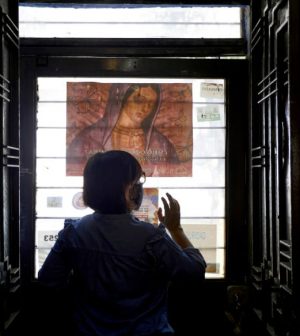- Finding Unshakable Power in a World That Wants to Pull Us ApartPosted 6 months ago
- What could a Donald Trump presidency mean for abortion rights?Posted 6 months ago
- Financial Empowerment: The Game-Changer for Women in Relationships and BeyondPosted 7 months ago
- Mental Health and Wellbeing Tips During and After PregnancyPosted 7 months ago
- Fall Renewal: Step outside your Comfort Zone & Experience Vibrant ChangePosted 7 months ago
- Women Entrepreneurs Need Support SystemsPosted 7 months ago
Coronavirus to have 'catastrophic' impact on women with domestic abuse up 20%

By Emma Batha and Ellen Wulfhorst | @emmabatha | Thomson Reuters Foundation
A three month lockdown could result in an additional 15 million cases of domestic abuse globally, says UNFPA
Coronavirus is changing the world in unprecedented ways. Subscribe here for a daily briefing on how this global crisis is affecting cities, technology, approaches to climate change, and the lives of vulnerable people.
LONDON/NEW YORK, April 28 (Thomson Reuters Foundation) – The coronavirus lockdown could lead to a 20% surge in domestic violence as victims remain trapped at home with their abusers, the United Nations predicted on Tuesday, warning the pandemic will have a “catastrophic impact” on women.
Tens of millions of women may be unable to access contraception and millions more girls could be married off or subjected to female genital mutilation (FGM) as a result of the pandemic, researchers said.
Every three months of lockdown could result in 15 million more cases of domestic abuse than would normally be expected, according to the UNFPA, the U.N. sexual and reproductive health agency which spearheaded the research.
The projections underscore what the United Nations has described as a “shadow pandemic” alongside COVID-19.
Coronavirus: our latest stories
Many countries have already reported spikes in calls to domestic abuse hotlines. At the same time the lockdowns are making it far harder for services and charities to reach women isolated at home.
“This new data shows the catastrophic impact that COVID-19 could soon have on women and girls globally,” said UNFPA head Natalia Kanem.
“The pandemic is deepening inequalities, and millions more women and girls now risk losing the ability to plan their families and protect their bodies and their health.”
The researchers predicted that 44 million women in 114 low and middle-income countries could lose access to contraception, leading to 1 million unintended pregnancies, if the lockdown lasts three months and causes major disruption to services.
The figure would rise to 7 million unplanned pregnancies if restrictions continue for six months, according to the study carried out with Johns Hopkins University, Victoria University in Australia and global health organisation Avenir Health.
“These are very realistic scenarios,” said Ramiz Alakbarov, UNFPA acting deputy executive director. “What we are saying is please do not deprioritize reproductive health and family planning services.
“This is a crisis within a crisis for women,” he told the Thomson Reuters Foundation.
UNFPA said health services may be too busy tackling COVID-19 to be able to provide family planning services. Women may also avoid visiting clinics due to infection fears or because of restrictions on movement.
The pandemic is also disrupting supply chains. Many types of contraceptive are expected to run out within the next six months in more than a dozen poorer countries, UNFPA warned.
Researchers also predicted there could be an extra 13 million child marriages and another 2 million cases of FGM in the next decade as the pandemic stymies global efforts to end both practices.
Deepening poverty caused by a global recession could also drive more families to marry off their daughters early, they said.
RELATED STORIES
Europe braces for domestic abuse ‘perfect storm’ amid coronavirus lockdown
Bogota’s supermarkets become safe spaces for women to report abuse
Abortion in a lockdown: India says ‘yes’ but women wonder how
(Reporting by Emma Batha in London @emmabatha and Ellen Wulfhorst in New York; Editing by Claire Cozens. Please credit the Thomson Reuters Foundation, the charitable arm of Thomson Reuters, which covers the lives of people around the world who struggle to live freely or fairly. Visit http://news.trust.org)
Our Standards: The Thomson Reuters Trust Principles.






